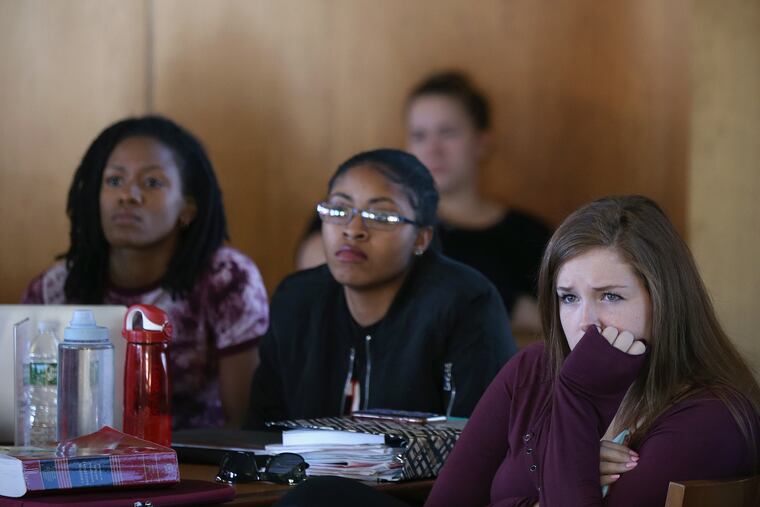Rutgers Law School students, professors rapt as Kavanaugh and his accuser testify during hearing
The future lawyers and their instructors say the testimony is historic and important to their profession, their campus and humanity at large.

It was a historic moment, one not lost on the more than 30 students and professors who gathered in a conference room at Rutgers Law School as an emotional yet steady Christine Blasey Ford said Supreme Court nominee Brett Kavanaugh had pinned her down on a bed when they were in high school and assaulted her.
"She's very credible," said Kylie Finley, 22, a second-year law student from Vineland, N.J. "She's been incredibly strong. Contrary to what many people are saying, she does remember most of the details. She's not changing her story. It was 36 years ago and she still remembers it. Just the fact that she's there telling her story and confronting all these horrible accusations against her is incredible."
Students found Kavanaugh, who testified forcefully and often tearfully in the afternoon that Ford's allegations were false, less credible.
"I'm not swayed by it," said Nakea Barksdale, 24, a second-year student from Willingboro. "I think he's honestly crying because this is jeopardizing his career."
But Dennis Patterson, a law professor, who after hearing Ford's testimony in the morning questioned how Kavanaugh could even begin to rebut it, found his at times emotional and at times methodical response effective.
"If we're not back to even, we're close," he said. "This is a lot harder than we thought it was."
But Kavanaugh's anger during initial questioning by Sen. Dianne Feinstein (D., Calif.) may have hurt him, Patterson said.
"He never should have interrupted," Patterson said.
The entire room was rapt as Ford testified in the morning and equally rapt when Kavanaugh spoke, though at times some laughed at the judge's continual sniffling.
"The contrast made him seem emotional to the point of hysterical," said Colin Sheehan, 22, a second-year student from Gibbsboro. "It also could be attributed to the fact that because she's a woman, her tears seemed more genuine."
No matter, the testimony was unforgettable to the room full of young law students, including Finley, who wants to be a sex-crimes prosecutor.
"Sexual assault," she said, "is pervasive throughout our whole country, but there are significantly more sexual assaults that occur on college campuses."
By the first break in the proceedings, students and faculty thought the prosecutor handling questions for committee Republicans and senators themselves had treated Ford fairly.
"So far, the prosecutor has been very polite, very thorough, and hasn't quite begun to come across as a prosecutor yet," said Kathryn Kovacs, a professor of law. "I do appreciate the relative lack of grandstanding. It is quite refreshing."
After hearing Kavanaugh's testimony, Kovacs was speechless. Asked whether she believed him, she said: "I get the impression that he believes him."
The conflicting testimony only points to the need to hear from more witnesses, she said.
Patterson questioned the decision to allow senators and the prosecutor to ask questions in five-minute increments.
"The procedure seems appallingly choppy and difficult to maintain," he said.
Barksdale said she hopes the procedure results in "justice."
"It's important to let people know that accusations will be taken seriously," she said.
As Ford described being threatened and having to leave her home since the allegations were disclosed, Barksdale said the college professor has done an important service, "shining a light on not only what survivors go through but how this impacts them."
She also was pleased to see Ford being treated with more respect than Anita Hill seemed to get when she lodged allegations against then-Supreme Court nominee Clarence Thomas in 1991.
"Rather than trying to discredit her, they are trying to get to the bottom of it and get to the truth," she said.
As the hearing continued after 12:30 p.m., the conference room remained full, and mostly quiet. But when Sen. Richard Blumenthal (D., Conn.) called President Trump's failure to ask for an FBI investigation of Ford's accusations "tantamount to a cover-up," the room erupted in applause.
Sheehan said that while most of the people watching in the law school conference room seemed supportive of Ford, others at the law school have different opinions.
"Those students have seemed less interested, at least in this setting, in watching it," he said.